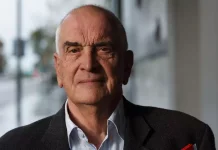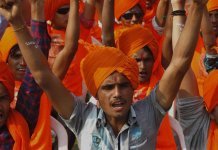The former Bishop of Botswana has launched a long-shot bid to become president of Zambia under the banner of former President Kenneth Kauda’s UNIP party. If elected at the August general election, Bishop Mwamba will become the second Anglican cleric after the Rev. Wavel Ramkalawan of the Seychelles, to lead an African nation.
A Zambian national, Bishop Mwamba trained for the ministry in the UK and was ordained deacon by the Bishop of Kensington in 1984 and served his curacy at St Luke’s Chelsea and All Saints, Notting Hill. In 1985 he returned to Zambia and became rector Luanshya and vocations director for the diocese of Central Zambia. Elected Bishop of Botswana in 2015, he resigned in 2012 to take up the post of Team Rector of Barking and assistant bishop of Chelmsford. In December 2019 he resigned those posts after his wife, Mmasekgoa Masire-Mwamba was appointed Botswana’s Ambassador to Germany.
He told reporters in Lusaka his United National Independence Party (UNIP) government would focus on integrity, social and economic welfare — placing the interests of the Zambian people at the center of all government programs. The poverty which held Zambia firmly in its grip, despite being blessed with abundant natural resources, was due to a failure of leadership and of moral character. What was missing from the ruling government was the quaility of love and social equality that had marked the rule of former president Kenneth Kaunda’s UNIP government.
The president and 156 members of the National Assembly will be elected at a general election scheduled for 21 August 2021. UNIP governed the country from independence from Britain in 1964 to 1991 under the socialist presidency of Kenneth Kaunda, and was the sole legal party between 1973 and 1990.
UNIP fared poorly in the 2016 general election under party president Tilyenji Kaunda, polling less than 1% of the vote, with President Edgar Lungu of the Patriotic Front winning 50.35% to Hakainde Hichlema of the United Party for National Development winning 47.63%.
Bishop Mwamba’s bid to reinvigorate UNIP and return it to power will be a difficult task, political observers note, as it holds no seats in the National Assembly. Kenneth Kauda was ejected from office when multi-party democracy was restored in 1991, and his “Zambian Humanism” policy of centralized state economic planning was abandoned by later governments.










